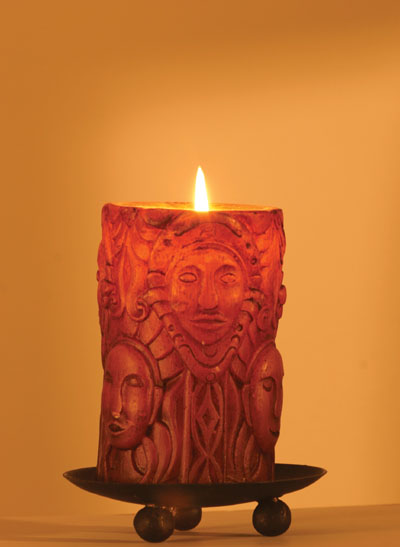The origin of candles is linked to the discovery of fire. Candles and torches have been, for many centuries, the only way to light mankind’s dark nights until the XIX century when it was possible to use electricity.
Primitive people used torches covered with animal fat and later, they began to use resin torches. To make a candle, the ancient Romans dipped a hemp string into hot liquid pitch,
and when the string was taken out, the remaining pitch solidified. Then the candle was dipped into hot liquid wax. Once extracted it became solid and ready to use. These candles, once fired, exhaled an intensely bad smell of tallow, the substance used to make the wax.
The problem with the bad smell existed until 1820 when two French men made the first stearin candle; stearin is a chemical wax without fats and producing no smell at all. In 1834, another French man invented a twisted wick that made the candles brighter. During all these years candles have been put inside houses, castles, tombs, temples and churches; anywhere light was necessary. With the coming of electricity, candles had been put aside and used only in emergency cases or to celebrate someone?s birthday. More recently, however, they have become a fashion and are a part of home decor. Candle makers have freed their creativity and new shapes and colours have been produced and sold.
For me, candlelight is linked with relaxation; when I want to take care of myself, or when I need it, after a long day or week of work, I switch off all the lights and light my candles, a background of good music, the latest edition of my preferred magazine, and a good herb tea is all I need to feel better.
For those in love, what?s more romantic than a candlelight dinner, just you, him and a warm trembling light transforming the most common room into a magical and mysterious place. For all these reasons I love to go shopping for candles and because they have become a fashion, it is possible to find them almost in every household objects store, perfumery, or supermarket. What I really love, however, are the artisan shops where they make and sell their own candles. Lately, I have discovered three of them:
– Candle?s Store
Via dei campani, 18 (Area: San Lorenzo)
This is my preferred. Two nice and very friendly young boys make wonderful candles using all kinds of shapes and colours. It is also possible to buy very nice and particular handmade candlesticks and candelabrums. Prices vary according to the candle size from 0,30 Euro (for the small floating candles) to 40 Euro or more for the biggest ones. They have also a huge variety of coloured candle holders made from wax.
– Candle House
Via della Maddalena, 41 (Area: Pantheon)
Different from the previous, this shop is owned by two nice young girls and their feminine presence and creativity can be seen in both the shop, which is very tidy and has a warm atmosphere, and in their creations which are full of colours and unusual shapes. They can reproduce, with wax, any kind of thing, from fruit to entire cakes or big coloured sculptures made from various blocks of coloured wax. They also accept orders. The prices vary, as usual, according to the size from approx. 5 Euro to 50 Euro or more.
– Cereria di Giorgio
Via S. Francesco di Sales, 85 (Area: Trastevere)
This is the big shop of Cereria di Giorgio, a traditional factory that has produced high quality candles for many years. This is the perfect place for those who are not interested in the peculiarity of the shape, but prefer the classic one and the quality. The prices are not the cheapest, but the huge variety can satisfy any taste.
In all three places it is also possible to find all the ?ingredients? to make candles at home; so free up your creativity and enjoy it!
The Rome Central – Italy in the world editorial staff consists of freelance editors, journalists, photographers, filmmakers, doctors, writers, video-makers, supporters, poets, writers, actors, singers and many friends.
RomeCentral is a Magazine completely no-profit , whoever writes in this magazine does his job without any commercial pressure.
NB: No people in Rome Central, from managers to employees etc .., receive any type of compensation.
The love for the free journalism repays all our efforts.

